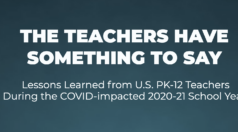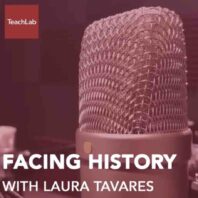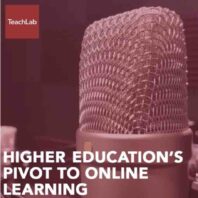COVID Research
Resources For Policymakers, School Leaders, & Teachers
In response to the COVID-19 pandemic, the Teaching Systems Lab has conducted a series of five reports capturing the voices and experiences of students, teachers, and educational leaders who have been learning, teaching, and leading as they respond to extended school closures and remote learning.
The Teachers Have Something to Say: To develop an in-depth, nuanced understanding of what teaching was like during the COVID-impacted 2020-21 academic school year, we interviewed 57 U.S. PK-12 teachers from across the country in public, charter, and private schools, at different grade levels, and in different subject areas. The primary message we heard from teachers is that they have not been valued as partners in designing our educational response to COVID. Specifically, the following three themes emerged from our interviews: 1.) exclusion from decision-making processes is demoralizing to teachers, especially when combined with worsening working conditions and widening inequalities; 2.) ignoring the concerns of teachers led to policymakers and school leaders advancing several seriously ill-considered ideas over the objections of practicing teachers; and 3.) teachers have developed a variety of effective instructional strategies in response to the challenging conditions of COVID. Delta is already disrupting school openings across the country. The school systems with the most effective approaches to pandemic schooling over the next year and beyond will be those that listen seriously to the concerns and insights of teachers and include them in design and decision-making.
Healing, Community, and Humanity: Understanding the experiences of students and teachers during pandemic schooling is vital to educational recovery and building back better. In the spring of 2021 as the school year was coming to close, we conducted three research exercises: 1) we invited 200 teachers to interview their students about the past year and share their findings, 2) we interviewed 50 classroom teachers, and 3) we conducted ten multistakeholder design charrettes with students, teachers, school leaders, and family members to begin planning for the 2021-2022 recovery year. Rather than a "return to normal" or the targeting of a narrowly-conceived "learning loss," the students and educators in our study emphasized themes of healing, community, and humanity as key learnings from the pandemic year and essential values to rebuilding schools. We recommend that in the 2021-2022 year, schools create structures for community members to reflect on the pandemic year, celebrate resilience, grieve what has been lost, and imagine how the lessons learned from a tumultuous year can inform more equitable, resilient school systems for the future. We provide guidance on four reflection protocols to use in school communities to advance this work.
Webinar:
What's Lost, What's Left, What's Next: To more deeply understand the practice and professional experiences of educators during the 2020 extended school closures, we interviewed 40 teachers from across the country in public, charter, and private schools, at different grade levels, and in different subject areas. From our conversations, three key themes emerged: 1) Student Motivation: Teachers struggled to motivate their students through two layers of computer screens; 2) Professional Loss and Burnout: As they lost familiar means of teaching, teachers also lost a fundamental sense of their own efficacy and professional identity; and, 3) Exacerbated Inequities: This sense of loss grew deeper as teachers witnessed the dramatic intensification of the societal inequalities that had always shaped their students’ lives. Effective planning for school reopening in Fall 2020 will require understanding and addressing these challenges facets of teachers’ experience. We propose five design considerations to plan for resilience: center equity, focus on relationship-building, address student motivation, address staff motivation and burnout, and mitigate uncertainty. All 35 full interview transcripts are available at https://osf.io/2fjtc/.
Imagining September. Reopening schools should be a community process with broad input from students and other stakeholders. Over May and June, we met with three groups of education stakeholders (parents, teachers, school and district leaders) and one student group to prototype online approaches to convening multi-stakeholder design meetings. We've published two reports, one for school leaders with guides and resources for facilitating online design charrettes, and one for educators and the public broadly, with principles and design elements for opening schools in the fall.
Remote Learning Guidance from State Education Agencies during COVID-19: In the report “Remote Learning Guidance from State Education Agencies During the COVID-19 Pandemic: A First Look”, we provide recommendations and best practices for state education agencies providing remote learning guidance during COVID-19 school closures.
Take a Deeper Dive
Related resources from COVID Research














